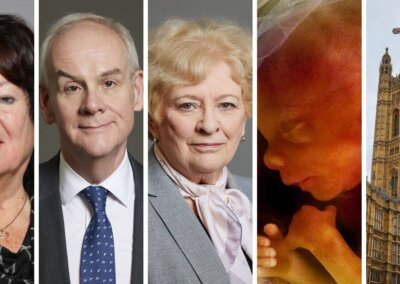The Minister for Health and Social Services in Jersey is undertaking a heavily biased consultation into the abortion laws on the island, which includes asking whether abortion should be made legal for any reason up to birth, and consults on whether to allow sex-selective abortion, whether to allow abortion on the grounds that a woman is pregnant with twins or triplets, and whether to remove all time limits in cases where the baby has a disability.
Abortion is currently permitted in Jersey up to 12 weeks if the mother’s pregnancy “causes her distress” (over 97% of abortions happen under this ground which in practice allows for de-facto abortion on demand up to 12 weeks), up to 24 weeks if the baby is likely to be “seriously handicapped” and at any point in pregnancy if there is a serious threat to the life or health of the mother.
Radical proposals
The consultation, which closes on 31 October, asks for Islander’s opinions on the radical view that abortion should be removed from the criminal law entirely and whether to adopt the extreme position of removing all time limits for abortion.
Concerningly, a number of sections are prefaced with highly partisan introductions.
Sex-selective abortion
In addition to asking whether abortion should be legal because a woman has twins or triplets, ‘Section 3’ of the consultation, in its preamble concerning sex-selective abortion, states that there is no restriction on sex-selective abortion in the current Jersey law because of “the 12 week gestation limit (ie. a person would not know the sex of the child at the 12 week point)”.
However, the NHS states that non-invasive prenatal testing (NIPT) which can be used to detect the sex of an unborn baby, is available from 10 weeks pregnancy. Private providers even offer NIPT to determine the sex of the unborn baby from 6 weeks of pregnancy.
Viability
While acknowledging that “international consensus cites the end of 22nd week as the ‘cut–off’ for viability of life”, the survey suggests there should not be a reduction in the abortion limit on that basis. Instead, it claims that “few severely premature babies survive without permanent disability”, and so suggests 24 weeks is a more reasonable cut-off point.
The consultation makes no mention, however, of the fact that the British Association of Perinatal Medicine estimates that two in three babies born at 22 weeks gestation which survive and three in four surviving babies born at 23 weeks will live without “severe impairment”.
Time limits
The consultation cites radical pro-abortion bodies which support abortion being made legal up until birth and claims the 12-week limit can be “problematic” for women who may be unaware they are pregnant. However, it omits to mention that the EU median time limit is 12 weeks, that 70% of women in the UK favour a reduction in abortion time limits and that only 1% support abortion being made legal up to birth.
Buffer zones
In the section on buffer zones, the consultation fails to spell out any of the arguments against their implementation. There is no reference to concerns that buffer zones restrict peaceful freedom of expression of people with pro-life views, or that such zones would likely prevent pro-life groups from offering practical support outside abortion clinics to women who may wish to keep their baby but feel coerced into an abortion or unable to provide for a child.
There is no mention either that in 2018 then Home Secretary Sajid Javid announced that a UK Home Office review had found no justifiable reason to introduce buffer zones, stating that: “…introducing national buffer zones would not be a proportionate response, considering the experiences of the majority of hospitals and clinics, and considering that the majority of activities are more passive in nature. In making my decision, I am also aware that legislation already exists to restrict protest activities that cause harm to others”. Similar legislation also exists already in Jersey.
‘DIY’ abortions
In its section on whether medical abortion should take place without clinical supervision, the consultation fails adequately to spell out the well-documented dangers of abortion ‘pills by post’ which have led to a significant increase in emergency callouts and women being admitted to hospital, or the risk of coerced abortion if in-person consultations are not required.
Nor does the survey mention abortion pill manufacturers’ own warnings about their drugs. Ranbaxy (UK) Limited, manufacturer of the mifepristone/misoprostol combination packet provided by BPAS through the post to clients, states there is a “non-negligible risk of treatment failure which occurs in 4.5% to 7.8% of the cases” while Linepharma, which manufactures mifepristone used by MSI Reproductive Choices, warns that the “non-negligible risk of failure, which occurs in up to 7.6% of the cases, makes the control visit mandatory in order to check that the expulsion is completed.”
Right To Life UK spokesperson Catherine Robinson said “This is not so much a consultation to find out what the public thinks as an exercise in bias seemingly to push for a relaxation of the law that would endanger both unborn babies and women. The one-sided, astoundingly biased, consultation regularly fails to properly put forth the pro-life side of the argument and frames its discussion of each issue to coax its readers into supporting fewer protections for unborn children. This is a highly partisan project and it is important that the people of Jersey are not duped by it”.












